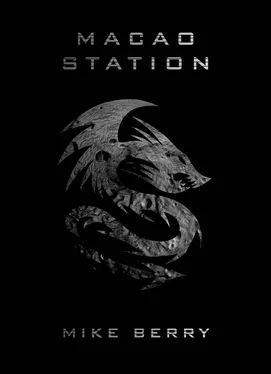Майк Берри - Macao Station
Здесь есть возможность читать онлайн «Майк Берри - Macao Station» весь текст электронной книги совершенно бесплатно (целиком полную версию без сокращений). В некоторых случаях можно слушать аудио, скачать через торрент в формате fb2 и присутствует краткое содержание. Год выпуска: 2012, Жанр: Космическая фантастика, на английском языке. Описание произведения, (предисловие) а так же отзывы посетителей доступны на портале библиотеки ЛибКат.
- Название:Macao Station
- Автор:
- Жанр:
- Год:2012
- ISBN:нет данных
- Рейтинг книги:3 / 5. Голосов: 1
-
Избранное:Добавить в избранное
- Отзывы:
-
Ваша оценка:
- 60
- 1
- 2
- 3
- 4
- 5
Macao Station: краткое содержание, описание и аннотация
Предлагаем к чтению аннотацию, описание, краткое содержание или предисловие (зависит от того, что написал сам автор книги «Macao Station»). Если вы не нашли необходимую информацию о книге — напишите в комментариях, мы постараемся отыскать её.
Macao Station — читать онлайн бесплатно полную книгу (весь текст) целиком
Ниже представлен текст книги, разбитый по страницам. Система сохранения места последней прочитанной страницы, позволяет с удобством читать онлайн бесплатно книгу «Macao Station», без необходимости каждый раз заново искать на чём Вы остановились. Поставьте закладку, и сможете в любой момент перейти на страницу, на которой закончили чтение.
Интервал:
Закладка:
MACAO STATION
by
Mike Berry
Thanks to Annie, without whom I would never have reached this point. I love you loads.
Thanks also to Kia and Lana. One day, I’ll write something that you’re allowed to read.
Thanks to everybody who has followed me, humoured me, retweeted me, amused me and encouraged me on twitter.
Thanks to the other authors who have supported me, specifically but not exclusively: Steven Montano; Scott Whitmore; Tyr Kieran; D.H.Nevins. When I am Lord, you will be spared.
And thanks most of all to you, for reading. Without you, I’d be talking to myself here.
Mike.Introduction
Of course the corporations won, in the end. What other entity could have endured the formative generations of Old Earth, could have grown larger and stronger even as the individuals who had founded them perished and were forgotten?
In the early days there was some protest as the strongest nation-economies of Earth gradually fell under the spell of the Super Corps. But such dissent was badly organised and under-funded, being bankrolled almost always by the poor. Before long, nobody really tried to stop the corps at all. They had grown so all-encompassing that virtually everybody, at least everybody who mattered, depended upon them in some way. They owned the raw materials, funded the schools, provided the jobs, paid for security, ran the hospitals, distributed the food. When the overcrowded Earth began to provide scarcer and scarcer opportunity, these emergent mega-companies began to turn their eyes skywards.
Gone were the days when space exploration had been the province of governments. Gone were the days when leaders had been chosen at the ballot. Those times were soon relegated to the creaking databases that slumbered in the bowels of information corporations, those organisations that grew to trade in the once-ubiquitous right to knowledge, history, fact itself.
Economic power became the linchpin that held the whole sociological and societal model together, the bedrock on which the system was built — became, in short, politics itself: Corpocracy. Leaders were chosen at the checkout, the net-node, the stock exchange. Shareholders’ profits, not national interests, would drive the explosion into space.
The strongest corporations struggled to climb over the carcasses of their unworthy fellows, scrambling upwards as if time were not only finite, but distinctly limited. They planted flags in rocks, planets, stars. They claimed any celestial body their grasping tentacles could reach.
Naturally, there were armed disputes. The richest usually won. Those who died in the Corp Wars were considered to be economic frontiersmen, traders in danger whose stock had simply fallen. Or more often, they were not considered at all, outside of the theoretical columns of numerals in the blurring minds of the company director-machines. Such was life. Such was the march of progress.
This expansion, planned by computers, executed by the brave, the radical, the dispossessed — any and every extreme of the human spectrum — continued apace despite the increasing remoteness of the frontier from humanity’s poisoned cradle. The corps became adept at terraforming, using this technology to warp every possible planet and moon the cosmos provided to their own ends.
The new worlds were fortified, fought-over, sometimes obliterated. Armies were grown in vats, raised in the corporate security forces, wiped out in wars with other clones. These soldiers were men and women who never knew what it meant to even be human; humans-as-tools, whose war was a pointless and inexplicable necessity to their fleeting lives.
And as the battlefield expanded in this tumultuous, bloody manner, so the distances that must be traversed in order to make war became more and more vast. Some corporations, driven to the brink of extinction, were spared the final coup-de-grace simply because the logistical costs of bringing the war to their doorsteps became more expensive than any potential victory was worth. Once again, balance sheets dictated a change in strategy.
As the distances grew, empires were consolidated, cemented in their vastness. Their sprawling borders became their armour, the vast distances of interstellar space their castle walls. And as the deep-space corporations became increasingly isolated from each other they began to tolerate each other’s distant existences.
Gradually it became apparent that there was not only enough for everyone but there was in fact too much — an effective infinity of space and materiel — so much that the abundance obscured any notion of claim , any necessity for rights , any will to fight expensive wars over bites of an infinite pie. The corps eventually pared back their support structures, securing only a handful of liveable offworlds each. They let their armies dwindle, keeping careful check on their fellows’ relative forces in an uneasy lockstep disarmament.
And as relative peace became the normal way of life for the pioneers of the space-faring corps, so a sense of disappointment spread with it. What had all the hurry, all the violence and destruction been for?
The corps had grown to rule their home world, had eventually out grown it, had battled across a thousand worlds and lost nine billion soldiers. . . and all for what? The cycle of expansion, consumption and exhaustion had become its own goal and its own propulsion. Some prominent thinkers suggested that this was the nature not just of humanity, but of the universe itself: it simply was ; it simply continued; there was no point as such, and that it would be best to come to terms with that as soon as possible. Then, perhaps, the human race could settle down and work out what came next. Whatever divergent course could be contrived, humans themselves would have to choose it and engineer it into being. But for now they mined, they built, they gradually settled into a sort of stasis.
The great warp engines of the empire-building pioneer ships fell victim to disrepair or decommission. The director-machines had plotted the value of further growth against the projected upkeep costs and reached the inevitable answer. Soon the only interstellar ships in service were those sub-light vessels essential to the maintenance of the status quo — freighters, troop ships, civilian shuttles.
Clearly, another race had gone before. Deepseeker Mining probes first found evidence of their existence on the frozen world of DSH-3, moon of the gas giant Maxima Omega. Once, DSH-3 had borne an Earth-analogous atmosphere, but the relics seemed to pre-date even the long-ago existence of any such hospitable environment. They came from an age of much greater temperatures and thinner air, and who could have built such towering spires of diamond-hard carbon and then deserted them without trace remained a mystery.
People named these others the Predecessors . But the knowledge that they had been and gone, leaving nothing but empty shells, served only to heighten humanity’s feelings of loneliness and increase the numbers of people who questioned the point in any sort of advancement.
Other Predecessor settlements were found near to ancient gas giants. All were as empty and deserted as those of DSH-3. A rumour circulated that the new psychoactive drug fader , which swept through human space leaving a trail of social devastation behind it, had been found on one such world. This, however, was generally discounted as a simple public relations exercise by the drug’s real manufacturers.
The corps declared a non-exploitation pact, unthinkable a few hundred years earlier, to cover all Predecessor worlds. After all, the Predecessors had only left their habitat-shells of carbon, an element more easily extracted elsewhere. Doubtless, the director-machines had measured any value in the exploitation of these ruins against the chance, however slight, that one day the vanishing Predecessors would reappear and want them back, and decided not to risk it. Humanity was alone again. Still.
Читать дальшеИнтервал:
Закладка:
Похожие книги на «Macao Station»
Представляем Вашему вниманию похожие книги на «Macao Station» списком для выбора. Мы отобрали схожую по названию и смыслу литературу в надежде предоставить читателям больше вариантов отыскать новые, интересные, ещё непрочитанные произведения.
Обсуждение, отзывы о книге «Macao Station» и просто собственные мнения читателей. Оставьте ваши комментарии, напишите, что Вы думаете о произведении, его смысле или главных героях. Укажите что конкретно понравилось, а что нет, и почему Вы так считаете.









![Джулия Берри - Нежная война [litres]](/books/405408/dzhuliya-berri-nezhnaya-vojna-litres-thumb.webp)


